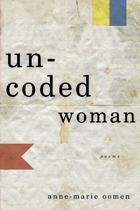Uncoded Woman

Anne-Marie Oomen’s first book of poetry, Uncoded Woman, is a narrative collection centering around a displaced Southern woman finding meaning and direction in a resort town on Lake Michigan.
The “uncoding” in the title refers to a persistent theme throughout the book. The prologue very simply defines the International Code of Signals—the maritime form of communication that involves flags and pennants with shapes. Each poem title is given in both its code signal form as well as its internationally recognized meaning. While a somewhat esoteric pretext for the poems that follow, we are thrust into the life of Bead and her boyfriend/husband, Barn, who fish, hunt, curse and steal as means of survival.
Bead’s voice is strong, yet vulnerable. Although unclear what, it is evident that she is running from something, finding inadequate but needed respite in a town usually overrun with tourists. Throughout the narrative, Oomen reveals glimmers of Bead’s past: death, flight, her yearning for Southern food and customs, her perpetual fear of water, possible sexual violation and definite violence.
As with most poetry, the text is extremely dense, with a myriad of metaphors, both sacred and secular. It shows a kind of Dorothy Allison imagery mixed with a Rita Dove skill for richness and brevity. The references to the “codes” are no novelty or hook; they pull each story together, and it is abundantly clear how each imagined communiqué relates to the “down home” nature of the text. Oomen exercises an immense restraint in depicting her characters and scenery where a lesser poet would have been tempted to fall back onto stereotypes or predictable tropes. It reads earthy and vernacular, yet the verse is nothing short of virtuosic.
In fact, the virtuosity itself was both the most enjoyable and most distracting aspect of the book. At certain points, the soul of the story becomes overly subdued in the beauty of the language. While it is clear that Oomen attempts to convey the inner conflict of Bead’s life, somehow ending the book with a question seems to take away from the immense strength and drive to survive that the reader is invited to witness throughout. I cannot help but wonder whether Oomen was over-strategizing at this point, trying not to come off as too pushy or trite.
Regardless of this small critique, the book is a strong piece of poetry that I would recommend to anyone searching for an excellent portrait of a Southern/Midwest woman trying to survive.